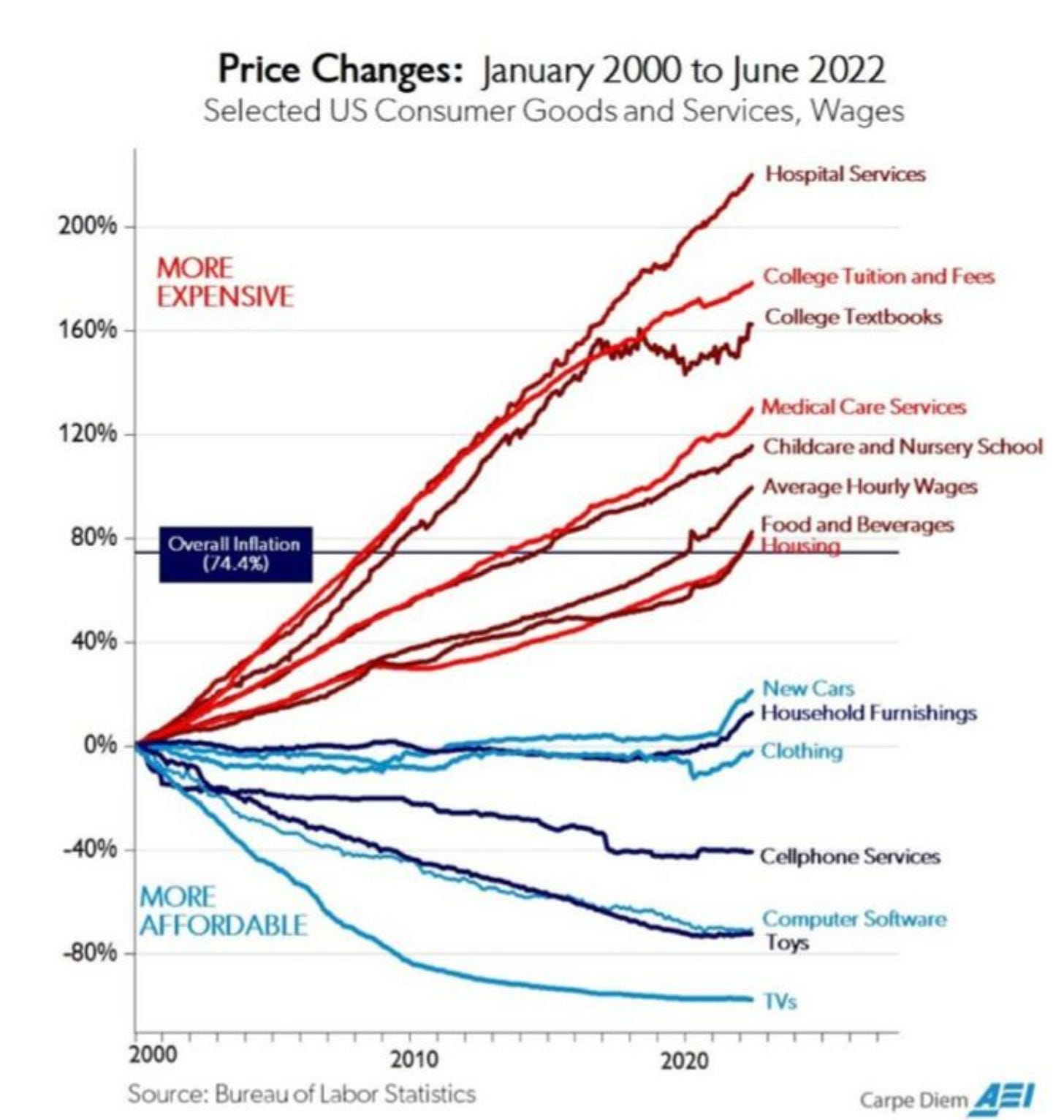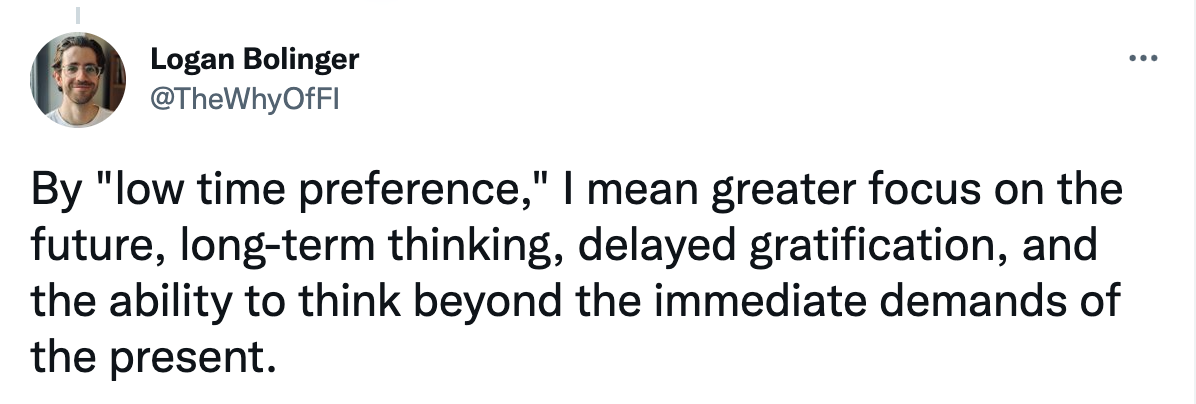Think Bitcoin™ Issue #41
How to Give Yourself a MacArthur Genius Grant
Hey friends, welcome back to Think Bitcoin™ for issue #41. Special welcome to the new subscribers. I’m glad you’re here. As always, if you have any questions or comments, feel free to reach out. You can also find me on Twitter (@TheWhyOfFI) and connect with me on LinkedIn.
In this issue:
Long Reads: Give Yourself a Deferred MacArthur Genius Grant
Threads: Lowering Time Preference Improves Everything
Content Round-Up: 3 articles
As always, if you find this newsletter interesting or useful, please share it with others who might find it interesting or useful, too!
Long Reads
Give Yourself a Genius Grant
Each year, the MacArthur Fellows Program selects a group of individuals who have shown “exceptional creativity” and “promise for important future advances.” The program awards each selected recipient a no-strings-attached grant of $625,000, paid out over a five-year period. These grants are colloquially referred to as MacArthur “genius” grants, and you’re undoubtedly familiar with some of the folks who have received them.
The idea behind these grants is essentially that the ever-increasing expense and stress of day-to-day life exacts a toll on people and, in most cases, inhibits them from pursuing the full expression of their potential and ability, which also means they’re inhibited from contributing the fullest extent of their gifts to society at large. The grant is intended to alleviate the grinding pressure of quotidian obligations and, in doing so, give creative folks from myriad disciplines the space and financial security to be able to focus on deep work.
Its recipients explicitly acknowledge how powerful this is.
Tami Bond, a 2014 Fellow: “The exciting thing is that you no longer have to be limited by what people allow you to do. Instead you can allow yourself.”
Sarah Otto, a 2011 Fellow: the grant “is meant to tell people we want you to be creative, we want you to change your life in the ways that you need to to have time to do the stuff that you do well.”
David Finkel, a 2012 Fellow: “If I have a net under me and I can take some chances that way…that’s psychologically huge.”
Carol Padden, 2010 Fellow: “I think that this award will help me do the kind of work that I have dreamed about doing but have not yet begun.”
I think these grants are wonderful, but I can’t help but think about how small the annual group of recipients is and wonder how many other deserving or would-be deserving artists, scientists, mathematicians, etc. could benefit from having a comparable amount of support placed beneath them.
That the demands of modern life in our fiat monetary system are acutely stressful and exhausting is not a profound observation. It’s ubiquitously manifest. Thriving Wallet recently conducted a study in which 90% of respondents said financial considerations affected their stress levels. Approximately 65% of respondents felt that their financial difficulties were piling up so much they couldn’t overcome them. 40% of respondents reported that daily management of money limited the extent to which they could enjoy their lives.
Childcare alone, as of 2018, costs the average American family approximately 18% of their household income. This percentage increased significantly during the pandemic (by 41% for center-based childcare providers), bringing the average percentage of household income spent on childcare to 20%.
A 2022 study conducted by Lending Tree yielded the following findings:
In addition to childcare, the average rent, as of July, 2022, had hit all-time highs for the 17th consecutive month. Couple this with sustained high inflation and there is simply not a lot of breathing room, financially, for most people in this country. And it’s clear from the data we have that the average person thinks about money quite a bit.
Being forced to spend so much time thinking about money, about how to keep up with inflation, how to save for retirement, and how to handle rising costs of healthcare, childcare, and college tuition, on top of having to do one’s job and provide the basic necessities, gravely limits the space one has, emotionally and intellectually, to pursue creative breakthroughs.
After all, if life increasingly comes to resemble a metaphorical treadmill, the speed of which is steadily increased, more and more focus must be directed toward remaining upright on the treadmill. Not falling behind becomes the most important, most pressing objective.
I think it’s worth asking how much growth, joy, and edification is being denied to the collective by our fiat monetary system? How many scientific discoveries and great works of art are not being pursued or created because their would-be authors are forced to spend all their time figuring out how to finance an increasingly expensive existence?
It’s additionally worth asking to what extent has the fiat monetary system, in its failure to provide sound money, adulterated the world of art by allowing an outsized monetary premium to be affixed to it. In other words, when money itself does not hold its value, markets monetize other assets, which take on monetary premia (think houses, paintings, collectibles, etc.).
Okay Logan, but what does this have to do with Bitcoin? I’m getting there.
With respect to art, generally, I think we live in an era of what I like to refer to as “the pretty good,” or the “high mediocre,” by which I mean lots of commercially viable, solid stuff but a diminishing amount of truly transcendent stuff. There’s sort of a race to the middle (in my opinion). I don’t want to imply that there’s no transcendent art being made. But I do want suggest that this type of art requires a certain level of attention, space, and flow to create and, from its viewer/recipient/reader, a certain amount of attention, openness, and work to absorb.
In our fiat world, with its hustle culture, its idolatry of busy-ness, and its implacable monetization of everything, it is hard for creators and their audiences alike to retain or cultivate the perceptual acuity and receptivity to make and be truly moved by transcendent art.
And so organizations like the MacArthur Foundation give grants to try to solve for this. But these grants only go to a few people. Surely there are more people with “exceptional creativity,” though it may be languishing and made necessarily latent by the exigencies of modern fiat life. Surely there are also plenty of folks who, with some space and some financial security, could show and fulfill a “promise for important future advances.”
Imagine unlocking all of this latent potential that’s trapped by the exceedingly tight constraints of everyday necessity. Now imagine what a boon this would be for humanity. Is there any way we can do this?
There’s of course no perfect answer or solution.
But recently I’ve been playing with the idea of Bitcoin as a kind of deferred MacArthur Fellowship for its earlier adopters (and to those reading, I am in the we-are-still-very-much-early camp). If Bitcoin adoption continues to grow, and if its compelling use cases continue to gain mainstream traction, possessing a little bit of bitcoin could, in the not significantly distant future, allow one a comparable level of space and security as a MacArthur Fellowship.
Is it a guarantee? Absolutely not. But do I enjoy envisioning a renaissance of art, science, and intellectual discourse a decade or so hence, when more folks find themselves, for the first time, with some breathing room and security to pursue their own unique genius? Yes, I do. And do I think that will be a positive development for humanity? Absolutely.
Threads
Content Round-Up
1. “Bitcoin Nature Fund: Could Bitcoin Fix What Gold Destroyed in the Peruvian Amazon Forest?” I love this piece by Ayelen Osorio from her Substack, The Misfit. She tells the story of Gilles Buck and his Bitcoin Nature Fund, which is a Bitcoin-only nonprofit dedicated to nature preservation. The fund’s first project is to use Bitcoin to change the incentive structure that has led to the Peruvian Amazon forest being ravaged by illegal gold mining AND to then restore that ravaged land.
2. “A Bitcoiner’s Guide to Proof of Stake,” an article by Scott Sullivan. Unless you’ve been living under an internet-less rock for the past few months, you are no doubt aware of Ethereum’s “Merge,” which was completed this past week and transitioned the chain from a proof-of-work consensus mechanism to a proof-of-stake consensus mechanism. There are truly massive differences between how these two consensus mechanisms work, and the implications/downstream effects of each are far-reaching. Bitcoin is now the only major blockchain that still uses the proof-of-work consensus mechanism. If you’re interested in a deep, thoughtful dive into what Proof-of-Stake is, what it means, how it works, and what could go wrong, check out this article.
3. “Comments on the White House report on the climate implications of crypto mining,” a piece by Nic Carter. In March of this year, President Biden signed Executive Order 14067, which related to digital asset development and its relationship to climate objectives. As part of this executive order, the White House Office of Science and Technology Policy (the “OSTP”) was tasked with conducting a study into the climate impacts of crypto mining. Last week, the OSTP released their report. Nic Carter goes through the whole thing with characteristic thoroughness, commenting (and providing sources) on what’s incorrect, misleading, based on shoddy data, etc.
Tweet(s) I’m Thinking About
The Bitcoin space has felt a little bit like a circular firing squad or a high school cafeteria lately, with folks spending lots of energy and, in some cases, nuking relationships, in the pursuit of perfectly defining what a bitcoiner is or what bitcoin maximalism is. I have mostly stayed out of these ongoing debates, despite having strong feelings on the issue. I think Mark pretty much nails it with this short tweet.
There are no purity tests in Bitcoin. There are no checklists or quizzes one needs to satisfy or pass. There is no politburo before which one must genuflect. Bitcoin is for everyone. It has no leaders. It has no formulary. Let us never forget.
As always, thanks for reading! If you enjoyed it or found it useful, share this newsletter widely and freely!
“Civilization is in a race between education and catastrophe. Let us learn the truth and spread it as far and wide as our circumstances allow. For the truth is the greatest weapon we have.” -H.G. Wells
See you in two weeks,
Logan
SPONSORSHIP INQUIRIES: If you’re a Bitcoin company (or you work for a Bitcoin company) and you’re interested in supporting the newsletter, please reach out via Twitter DMs (@TheWhyOfFI) or email (askthewhyoffi@gmail.com).
SUPPORT
Send bitcoin to my Strike
SOCIAL
DISCLAIMER: I am not investment advisor and this is not investment advice. This is not, nor is it intended to be, a recommendation to buy or sell any security or digital asset. Nothing in this newsletter should be interpreted as a solicitation, a recommendation, or advice to buy or sell any security or digital asset. Nothing in this newsletter should be considered legal advice of any kind. This newsletter exists for educational and informational purposes only. Do your own research before making any investment decisions.
© Copyright Logan Bolinger, Think Bitcoin LLC







